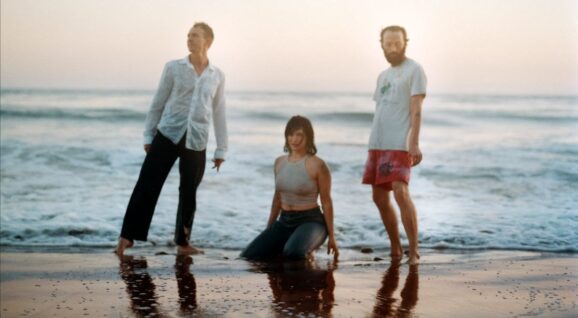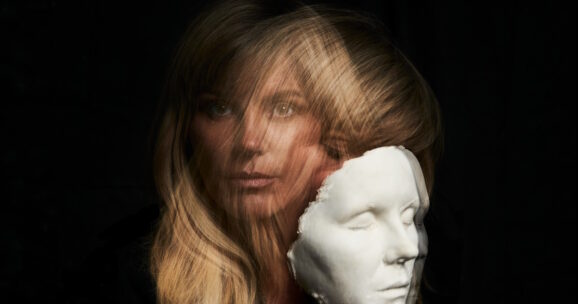The Brothers is not merely an exercise in nostalgia. It is, instead, exactly what it purports to be, a celebration of the music of the now-defunct Allman Brothers Band. Recorded and filmed on March 10, 2020, the cohesion herein is hardly an illusion and certainly no less impressive for the pedigree of the players involved or their shared history in the latter day lineup of the seminal Southern rock ensemble. And yet it is fair to state this concert calls to mind the later ABB runs at the Beacon Theater, around this very same early spring time of year (albeit without any guest sit-ins whatsoever): there are a few brilliant moments and no real risks taken.
That said, each portion of the two-set, roughly three-hour show at Madison Square Garden is an object lesson in the fine art of pacing. Beginning with a clutch comparatively concise set pieces like “Revival,” extended improvs only begin with guitarist Derek Trucks’ white-hot solo on “Don’t Keep Me Wonderin’,” immediately after which he’s joined in that level of intensity by Warren Haynes on “Black Hearted Woman.” Here the duo ever-so-faintly tease the Grateful Dead’s “The Other One” they explored so fully in the past, but notably rein themselves in, in for the sake of caution, along with the rest of the group (there were but four days of rehearsals, not years of experience to hone the collective instincts).
Nevertheless, it’s there the pair illustrate what a formidable fretboard team they became in their time together as Allman Brothers. The two further reaffirm that notion during their successive solos on “Dreams:” each is equally imaginative and free of cliche. By this time too, Trucks has reminded us how his intricate slide guitar work reinvented the signature sound of the original ABB as formulated by the late Duane Allman. Nevertheless, when Haynes utilizes the technique on “Stand Back,” he reminds of the prowess he brought to the Brothers’ reunion in 1989 (and actually improved his skill in ensuing years).
At this point, Chuck Leavell had been introduced to add the piano integral to “Come And Go Blues.” His gospel-inflected work also complements the Hammond B3 lines during an intro to “Soulshine,” these supplied by his partner keyboardist Reese Wynans (a latter-day accompanist to Stevie Ray Vaughan and actually an early pre-Allmans bandmate of formidable guitarist/composer Dickey Betts and late bassist Berry Oakley) Of course, Leavell’s real spotlight, not surprisingly, is his ebullient break on the ivories during “Jessica,” the signature instrumental from 1973’s Brothers and Sisters; this take is an ideal fusion of the original arrangement and the dual-guitar version Trucks and Haynes perfected in the Allmans’ later years.
Such visceral moments come in fairly quick succession as the show moves into its second half. A brief break near the end of a comparably truncated “Mountain Jam” reminds no extended drum interlude took place this evening on the threshold of quarantine lockdown(s); the only other such segments appear on “Hot ‘Lanta” and a concise rendition of “In Memory of Elizabeth Reed,” during which snappy rounds work Derek’s sibling Duane and co-founding Brother Jaimoe at their respective drum kits, in tandem with the versatile Marc Quinones at his array of percussion devices. The resounding clarity and punch of those rhythms, around and through which rumbles Burbridge’s bass, brings to mind how accurately Jon Altschiller recorded this show: the engineer makes room for all the voices and instruments, proportionate to their overall importance in the sound of the band.
In that sense, the audio mix mirrors a selection of material that spans the history of the Allman Brothers. Up to and including a cull from the band’s final studio album, 2003’s Hittin’ The Note “Desdemona,” Warren’s lead vocals only naturally echo Gregg’s, but the similarity in phrasing is especially evident (though without any self-conscious replication) on the vintage likes of “Ain’t My Cross to Bear,” from the eponymous ABB debut LP. There would be no surprises per se on The Brothers at all, if it were not for Leavell’s front and center singing on “Blue Sky” (whose estranged author was understandably absent from these proceedings). That said, this “Whipping Post,” in closing these proceedings sans encore, is startling in its violent fury and suggests no lack of stamina (or empathy) on the part of these men.
In terms of expectations too, minimal stage production would be the rule of thumb for the Allmans. It should be noted, however, that the ever-shifting colors on the giant mushroom above and behind the MSG stage, in combination with a light show that mirrored the dynamics of the musicianship, is a step up from the cheesy graphics the Brothers used in their last decade. The video camera work is likewise restrained, sans any extraneous effects that might otherwise distract (though the absence of many shots of the sold-out crowd is puzzling). Unfortunately, that same no-frills approach manifests itself poorly in the packaging of this title on DVD.
In contrast to the polish and enthusiasm radiating from the stage beginning to end, this video package leaves more than a little to be desired. There are some good photos of all participants in the enclosed pamphlet of four pages, but a more expansive array might’ve been included instead of (or in addition to) essayist John Lynskey’s strained and hyperbolic prose. Likewise, filmed interviews with at least some of the musicians, most likely the principals would provide insight into the sequence of events that lead to the event and perhaps even some post-mortem about how it felt to play together (again); such bonus content added tremendously to the much superior Brothers on Broadway release in this configuration from 2003.
Not the innovative likes of The Allman Brothers Band at its best over the course of its forty-five-year history, this eight-man cadre of kindred spirits nevertheless did justice to the memories of their departed bandmates and sundry other collaborators (like impresario Bill Graham and record producer Tom Dowd). And it wasn’t just in the video projections appearing, most fittingly, during “No One To Run With:” reservations notwithstanding, The Brothers is testament to the legacy of a fiery and largely improvisational fusion of rock, blues, country, and jazz that clearly continues to inspire over half a century since it first crystallized under the aegis of ‘Skydog.’










One Response
I hope to they do something big for October 29th 2021 50th year memorial for Duane Allman,put out some rare 1971 shows besides Fillmore East it’s been done so many Times how about Love Valley festival,some primo later 1971 full shows or even filler from shows that had great songs but the shows in whole had to be edited